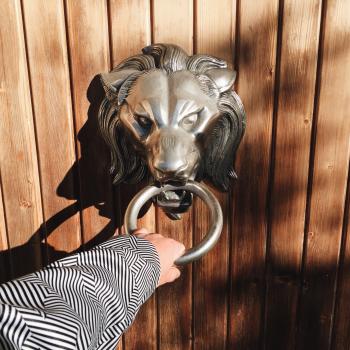In my last post I wrote about the Otherfaith dedication vow that our community has been working on. One part of that vow has hounded me a lot since I first drafted it: “I will act with hospitality and compassion toward all.”
Though I’ve been working for a while on being a better person (an unfortunately vague concept), on being kinder and more compassionate, writing it in the vow was like a catalyst. What exactly does compassion look like? When am I failing to live up to the Gods’ and my own expectations of proper behavior? And what are the limits of compassion?
Hospitality and Its Meaning
Hospitality is primarily about the relationship between hosts and guests. Modern practitioners of various Paganisms will often talk about the importance of hospitality and the sacred nature of the guest-host relationship. Some polytheists describe relations with the Gods in guest-host terms.
The agreement between the guests and their host can depend, quite heavily, on cultural norms. For reconstructionists these cultural norms will likely come, in part, from the culture they are reconstructing. Many of us already have ideas about proper behavior when hosting or visiting as a guest, instilled in us by our parental figures. Expected behaviors can fall along gendered lines as well. Part of being an adult, I think, is deciding what parts of hospitality we were taught we want to keep with us into the future to teach our own children or other young ones.
I am not as good of a host as I wish to be. I am certainly not as excellent as my mother was! But I do aspire to be an adequate host and to train myself into a good host. Hospitality as a concept is not so difficult for me. This is not to say that I get it right every time. Figuring out when guest-host relations have been broken or violated isn’t as difficult as the more vague ‘compassion’.
Compassion As a Virtue
According to this article, compassion means ‘to suffer together’. Compassion seeks to alleviating the suffering of others.
When I was a young adult, just entering into adulthood, I turned away from compassion. If life sucked for me then it was only fair that it sucked for others, and I had no business trying to make it better for anyone. I had been a crybaby of a child growing up, too sensitive but especially sensitive to the wrongs of the world. The desire to not feel so bad all the time, so raw, led me to a friend group that was convinced that being mean in the face of injustice was the right choice. We were convinced of our righteousness and cloaked our vicious behavior by claiming it was for the greater good.
Eventually I grew out of that friend group. Being mean hadn’t fixed anything in me, and it had just resulted in hurting others. I had learned how to stand up for myself in the worst ways. I was left trying to learn how to not be a, well, giant asshole.
Compassion wasn’t really a virtue in the Otherfaith, at least back then. I was wrapped up in the Laetha, the God of fire and destruction. He’s far more inclined toward revenge. His heart like a despairing, endless fire that burns down everyone around Him. Not exactly the best God to turn to for cultivating compassionate behavior.
The Clarene, however, was much more concerned with compassion. She is the Other People’s God of hearth and home, so Her ties to hospitality are obvious. And while She can have retributive aspects, Her lessons for me, the ones She’s striven to impart every time I sit before my altar, have always included being kind and thoughtful. Consider the others around you, their suffering and desires, and try to uplift them. Don’t push them down in the muck.
And if She wants it to be a virtue, well, I’m definitely putting it into the dedication vow.
Compassion and Conflict
So, I’ve been working on being kinder. Compared to that awful time in my life, I’m doing a lot better. But I always want to improve. Take a breath, pause a moment, consider if what I want to say needs to be said. Bringing more kindness into the world is part of my spiritual goal. I don’t want to hurt people.
Sometimes that is the only option, though.
There are times in our lives where we will have to stand up not just for ourselves but for people who can’t stand up for themselves. We have to confront wrongdoing and harm where we see it. Being gentle and well-spoken can alleviate some harm. We can persuade or convinced. But sometimes you run into someone who can’t be convinced or dissuaded with gentleness, with words, or with warnings.
(Did I deserve compassion when I was being absolutely horrid? Sure, a bit. But I also deserved the people rightfully telling me that I was being a jerk and worse. Neither ‘side’ of that coin woke me up quicker.)
For some of us, we end up having to confront our family. Dark secrets, shameful acts, or horrific behavior that comes into the light – what we decide to do in the face of that helps makes us who we really are. Then again, I’ve never put family above anything and everything else.
A year or two back I ended up having the limits of my compassion tested pretty thoroughly. I had to decide if saying nothing and letting someone verbally harass me was the better action. (And I deserved it, part of me thought, because I had been awful to people before. So it was only ‘fair’ and ‘right’. Right?) If it had just been me taking the brunt, I may have let it go. Some people just don’t get along, and part of being compassionate is understanding that ‘not getting along’ isn’t something to be fixed. It came out that I was far from the first person chased out and harassed by this individual, though.
And I was faced with the question: was reporting them the better option? Or should I keep silent? If I reported what had happened I would have to repeat, however many times deemed necessary, what had happened. Reporting certainly wouldn’t be kind for the person at the center of everything. Any consequences that came from the reports could hurt the community. Could hurt my own goals and pursuits in the longer term.
I don’t think we can be endlessly compassionate and forgiving the face of great harm. I think we must strive to do what is ethically and morally right even when it hurts, either us or another.
(Though the site is no longer active, I am participating in the ‘Pagan Blog Project’. The PBP encouraged writers to write throughout the year, focusing on prompts based on the letters of the alphabet. For the ‘C’ prompt, I chose ‘compassion’.)
















